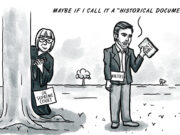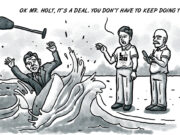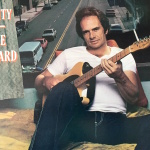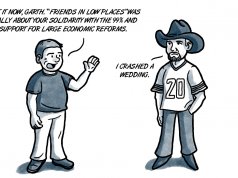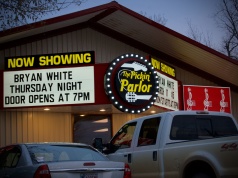
If you were to turn on your radio and tune to a country station right now, you undoubtedly would hear song after song espousing the merits of country values and the simple pleasures of rural life.
You would be regaled with tales of beer, whiskey, tan-legged women and summer nights spent in pursuit of the aforementioned. You might even hear a song or two decrying all of those big-city fools who don’t fish or hunt, who get more than 15 mpg and who don’t stockpile weapons like they’re preparing for the apocalypse.
Maybe I’m exaggerating a little bit, but the fact remains that much of the music coming out of Nashville these days amounts to little more than a redneck dick-measuring contest set to music.
This phenomenon, however, is indicative of a greater problem within Nashville and country music: a lack of authenticity. In fact, Nashville seems fairly unconcerned with producing music that offers honest ruminations on the experiences and lives of rural folk. The city’s country music industry seems more concerned with selling beer.
‘A certain amount of honest vulnerability’
I spent four years of my life playing guitar in a regional country band. It was never a situation I expected to find myself in, and, in retrospect, the entire experience seems a bit strange.
RELATED
Misery and gin: Merle Haggard dead on 79th birthday by William W. Savage III
I grew up in Woodward, Okla., during the ’90s, when Garth Brooks still reigned supreme as the king of pop-country. I hated it. I avoided country music at all costs. To me, it was the hokiest thing on Earth, which was an unpopular opinion in northwest Oklahoma. Little did I know that, in a few years, the music I so despised would seem downright artful when compared to the “product” Nashville labels churn out in the 21st century.
A song like Garth Brooks’ Friends in Low Places seems like Shakespeare when compared to contemporary hits that would have you believe the measure of a man can be determined by the count of empty Bud Light cans in his trash.
While I’m sure there are a great number of people who would view Low Places as reveling in drunkenness, there is a subtext of confession, a sense that the singer is acknowledging his own faults. There’s a certain amount of honest vulnerability. I’ve never once heard that song and thought, “I wanna be that guy.”
Which leads us to the root of our current dilemma.
Pop country is a beer commercial
Nashville is trying to sell you an idea of what your life should be like. Whereas a listener might pity the sad-sack character in Low Places, listeners of country radio today are more likely to envy the singers of current hits. They portray country life as a never-ending party where the Bud Light flows like water and all the women are beautiful and will sleep with you, provided you have a truck.
Practically, the pop-country lifestyle is a beer commercial, and there might actually be reason to believe it literally is a beer commercial, at least in some convoluted corporate-synergy way. I personally have heard Nashville label executives stress the importance of being able to sell beer as a factor of market viability, and there is a reason for it. Across genres, the music industry has failed to adapt to the technological developments that have changed the distribution game. As such, labels increasingly rely on revenue streams other than record sales to turn profit.
While this piece is not intended to be a deep analysis of the music industry’s failings as a whole, these factors do have detrimental influence over the quality of country music. In the past, recording artists had contracts by which record companies made the bulk of their profit from album sales. With album sales plummeting, record companies have turned to something known as 360 deals, wherein the record company is entitled to a certain percentage of all of an artist’s earnings, be they from record sales, endorsement deals, ticket sales, etc.
In the past, a record company wouldn’t have any claim to an artist’s ticket sales past what they were contractually allowed to recoup for expenses like tour support. The prevailing idea was that the tour or concert was like marketing for the album. The record company would make money because a tour would publicize an artist’s release and, subsequently, people would buy that release. However, the aforementioned declining album sales have hindered the label’s ability and willingness to spend the massive amounts of money needed to finance a large-scale tour.
Corporate sponsorship replaces album sales
This is where corporate sponsorship comes into play. If you’ve been to a concert lately, chances are you’ve seen corporate sponsorship firsthand. It’s not something anyone tries to hide. Rather, corporate logos — Budweiser, Ford, whatever — are a ubiquitous sight at virtually all major concerts and festivals. Corporate sponsorship spells bad news for music because it treats the music as an afterthought.
So, in order to put on concerts, acts need sponsors. From the perspective of the corporations, the goal is to have as wide of an appeal as possible. When translated to music, this often equates to a generic product lacking originality or sincerity. About a year ago, YouTube user SirMashalot compiled a shocking mashup of six country songs that were so similar as to be nearly indistinguishable.
The proof, as they say, is in the pudding, as all six songs have been industry hits.
Conformity in country music
While corporate sponsorship is in no way limited to strictly country music, it does affect country in a more readily apparent way than in other genres or forms of entertainment.
Nowhere is this more obvious than in direct references to specific brands in popular country songs. Writing for Truthinadvertising.org in 2014, author Roger Kimball counted incidents of product placement in song lyrics across various genres of music. He found that — out of pop, country and hip hop — country music had the most, with 24 specific brand references in the top 10 songs for that given period. Not surprisingly, a number of these references were for beer and liquor.
It’s quite easy to find more examples of product placement in country music. For instance, the god-awful Florida Georgia Line “song” Cruise repeatedly name drops Chevrolet. (You’ll note I put “song” in quotation marks and, quite frankly, I’m ashamed to be aware of its existence.)
RELATED
Tishomingo: A new hub of country music by Tiara Blue
Purposefully stupid songwriting is unfortunately characteristic of the Nashville scene. Last summer I had the unique experience of participating in a writing session with a pair of professional Nashville songwriters. These people are fully aware of the plastic, mediocre quality of Nashville country; in fact, it’s a mediocrity they actively strive for. During the course of the session, numerous song ideas were shot down for being too complex or otherwise “inaccessible.” It was actually uttered by one of these writers that “anyone can write Stairway to Heaven, but you have to be clever to write something this stupid” (referring to the pop-country song we were writing). I don’t fault these individuals for trying to make a living — after all, I was attempting to do the same thing at the time — but when cynicism supersedes originality, art suffers. It’s like the audio equivalent of a Michael Bay movie. We know it sucks. Michael Bay knows it sucks. The studio knows it sucks, but it will make a billion dollars internationally so who cares?
‘Corporate monster’ should outrage fans
Advertising is a reality of modern life, but there’s something particularly disgusting about how it has been integrated into country music. What was once a cultural cornerstone that expressed the unique life experiences of folks in rural America has been bastardized into a corporate monster, a veritable Biblical Beast that dispenses F-150s, Bud Light and discount store misogyny on a previously unheard of scale.
I firmly believe the integration of advertising and corporate influence should outrage country fans. By being marketed to, they are being reduced to a caricature that could become a reality as time goes on. My fear is that younger generations will be unable to distinguish this phony Nashville portrait from reality, in turn compromising their own individuality by conforming to a standard manufactured for the purpose of marketing terrible music.







